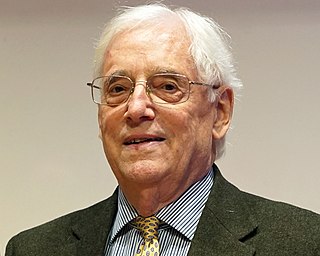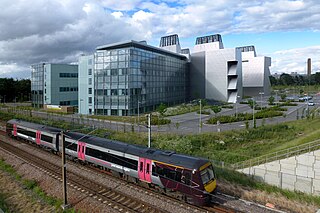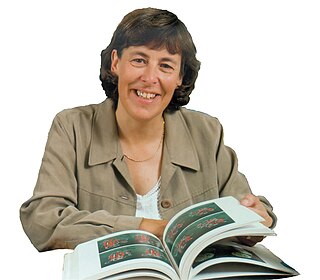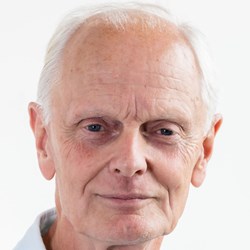Related Research Articles

Sir Gregory Paul Winter is a Nobel Prize-winning English molecular biologist best known for his work on the therapeutic use of monoclonal antibodies. His research career has been based almost entirely at the MRC Laboratory of Molecular Biology and the MRC Centre for Protein Engineering, in Cambridge, England.

Sir John Ernest Walker is a British chemist who won the Nobel Prize in Chemistry in 1997. As of 2015 Walker is Emeritus Director and Professor at the MRC Mitochondrial Biology Unit in Cambridge, and a Fellow of Sidney Sussex College, Cambridge.

The Medical Research Council (MRC) Laboratory of Molecular Biology (LMB) is a research institute in Cambridge, England, involved in the revolution in molecular biology which occurred in the 1950–60s. Since then it has remained a major medical research laboratory at the forefront of scientific discovery, dedicated to improving the understanding of key biological processes at atomic, molecular and cellular levels using multidisciplinary methods, with a focus on using this knowledge to address key issues in human health.

Richard Henderson is a British molecular biologist and biophysicist and pioneer in the field of electron microscopy of biological molecules. Henderson shared the Nobel Prize in Chemistry in 2017 with Jacques Dubochet and Joachim Frank. "Thanks to his work, we can look at individual atoms of living nature, thanks to cryo-electron microscopes we can see details without destroying samples, and for this he won the Nobel Prize in Chemistry."
Sir John Anthony Hardy is a human geneticist and molecular biologist at the Reta Lila Weston Institute of Neurological Studies at University College London with research interests in neurological diseases.
Dame Jean Olwen Thomas, is a Welsh biochemist, former Master of St Catharine's College, Cambridge, and Chancellor of Swansea University.

Dame Janet Maureen Thornton, is a senior scientist and director emeritus at the European Bioinformatics Institute (EBI), part of the European Molecular Biology Laboratory (EMBL). She is one of the world's leading researchers in structural bioinformatics, using computational methods to understand protein structure and function. She served as director of the EBI from October 2001 to June 2015, and played a key role in ELIXIR.

Tomas Robert Lindahl is a Swedish-British scientist specialising in cancer research. In 2015, he was awarded the Nobel Prize in Chemistry jointly with American chemist Paul L. Modrich and Turkish chemist Aziz Sancar for mechanistic studies of DNA repair.
George Gow Brownlee FRS FMedSci is a British pathologist and Fellow of Lincoln College, Oxford.

Sir Shankar Balasubramanian is an Indian-born British chemist and Herchel Smith Professor of Medicinal Chemistry in the Department of Chemistry at the University of Cambridge, Senior Group Leader at the Cancer Research UK Cambridge Institute and Fellow of Trinity College, Cambridge. He is recognised for his contributions in the field of nucleic acids. He is scientific founder of Solexa and biomodal.

Roger Sidney Goody is an English biochemist who served as director at the Max Planck Institute for Molecular Physiology in Dortmund from 1993 until 2013. Since 2013 he is Emeritus Director of the institute.

Terence Howard Rabbitts FRS FMedSci is currently Professor of Molecular Immunology at the Institute of Cancer Research, London.

Richard Nelson Perham, FRS, FMedSci, FRSA, was Professor of biochemistry at the University of Cambridge, and Master of St John's College, Cambridge 2004–07. He was also editor-in-chief of FEBS Journal from 1998 to 2013.
Sheena Elizabeth Radford is a British biophysicist, and Astbury Professor of Biophysics and a Royal Society Research Professor in the Astbury Centre for Structural Molecular Biology, School of Molecular and Cellular Biology at the University of Leeds. Radford is the Associate Editor of the Journal of Molecular Biology.

James Henderson Naismith is a Scot, Professor of Structural Biology and since autumn of 2023 the Head of the Mathematical, Physical, and Life Science Division (MPLS) Division at the University of Oxford. He was the inaugural Director of the Rosalind Franklin Institute and Director of the Research Complex at Harwell. He previously served as Bishop Wardlaw Professor of Chemical Biology at the University of St Andrews. He was a member of Council of the Royal Society (2021-2022). He is also currently the Vice-Chair of Council of the European X-ray Free Electron Laser and Vice-President (non-clinical) of The Academy of Medical Sciences.

Sarah Amalia Teichmann is a German scientist, the former head of cellular genetics at the Wellcome Sanger Institute and a visiting research group leader at the European Bioinformatics Institute (EMBL-EBI). She serves as director of research in the Cavendish Laboratory, Professor at the University of Cambridge and Cambridge Stem Cell Institute, and is a senior research fellow at Churchill College, Cambridge.

Jane Clarke is a British biochemist and academic. Since October 2017, she has served as President of Wolfson College, Cambridge. She is also Professor of Molecular Biophysics, a Wellcome Trust Senior Research Fellow in the Department of Chemistry at the University of Cambridge. She was previously a Fellow of Trinity Hall, Cambridge. In 2023, she was elected to the National Academy of Sciences.
Sir Hugh Reginald Brentnall Pelham, is a cell biologist who has contributed to our understanding of the body's response to rises in temperature through the synthesis of heat shock proteins. He served as director of the Medical Research Council (MRC) Laboratory of Molecular Biology (LMB) between 2006 and 2018.

Edith Yvonne Jones is a British molecular biologist who is director of the Cancer Research UK Receptor Structure Research Group at the University of Oxford and a Fellow of Jesus College, Oxford. She is widely known for her research on the molecular biology of cell surface receptors and signalling complexes.
References
- 1 2 "Dr Mariann Bienz FMedSci FRS". London: Royal Society. Archived from the original on 17 November 2015.
- ↑ "Mariann Bienz Curriculum Vitae" (PDF). Retrieved 8 June 2019.
- ↑ Staff. "The Academy of Medical sciences: Fellows: Dr Mariann Bienz FRS FMedSci". Academy of Medical Sciences. Archived from the original on 20 August 2011. Retrieved 21 October 2012.
- ↑ "Protein and Nucleic Acid Chemistry Division".
- ↑ "Mariann Bienz Curriculum Vitae" (PDF). Retrieved 8 June 2019.
- ↑ Staff. "Dr Mariann Bienz Authorised Biography – Debrett's People of Today, Dr Mariann Bienz Profile". Debrett's . Retrieved 21 October 2012.
- ↑ "Bienz, Dr Mariann, (Lady Pelham)" . Who's Who . Vol. 2015 (online Oxford University Press ed.). A & C Black.(Subscription or UK public library membership required.)
- ↑ Bienz, M (2006). "Bio-sketch for Oncogene Review Issue on Wnt signalling". Oncogene. 25 (57): 7441. doi: 10.1038/sj.onc.1210062 . ISSN 0950-9232. PMID 17143287.